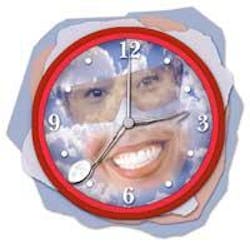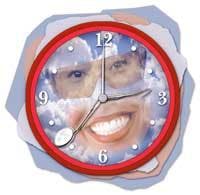The One-Hour Appointment
by Barbara Burlew, RDH, BS
You are running on, or ahead, of schedule as usual. You have a full hour for lunch. You're almost always finished on time. You have time for sharpening instruments and patient education. You are not burning or "rusting" out and you love your job.
Welcome to "Hygiene Heaven." (If you are happy with assisted or accelerated hygiene, please turn to the next article.)
The one-hour appointment
"I would never go back to 45 minutes — there never was any time for patient education," says Joan Evers, RDH, of Whitehouse Station, N.J. "My boss feels that's the most important part of the appointment."
Paul Ferguson, DMD, of Fair Haven, N.J., agrees. "With 45 minutes, we rarely stayed on schedule, which annoyed some patients and created tension among the team. Many patients, though, were accustomed to it and routinely arrived late. The receptionist was always anxious with the providers because she had to deal with the waiting room full of patients. The hygienists would get anxious if the dentist could not come for an exam right away, and the dentists felt pressured to drop what they were doing to do hygiene exams and keep their encounters brief. There was never enough time for even simple adjunctive services such as alginates for whitening, study casts or nightguards."
"Even FMX were usually asked to come back for a separate appointment (with an assistant)," Ferguson continues, "which means that many never got done. Now we can do these things without getting off schedule and the dentists can spend time developing relationships with the hygiene patients, all with much less tension among staff. We're also moving toward increased profitability since we changed to one-hour appointments."
Relationships
Would you expect to have a good relationship with your spouse or children if you spent very little time with them? Good relationships take TIME. While it's possible to delegate tasks to an assistant so the hygienist can see more patients, the patients spend less time with "their" hygienist. A lot is accomplished as you walk toward the operatory, take their X-rays, chat while you glove up and review their dental and health histories. A relationship develops when you are in the room together and your hands are NOT in the mouth.
"The relationship that a hygienist has with her patients has got to be one of the most rewarding gifts of our profession," comments Heather Mapp, RDH, MEd. Mapp is the program director of Lanier Technical college in Gainesville, Ga., and is the founder and president of Dental Hygiene Seminars, Inc.
Journal articles on assisted or accelerated hygiene are common. Is this concept a good one? The hygienist's load increases from eight patients to 12 patients in one day with a hygiene assistant. As a "business decision," it certainly can increase office revenue. A March 2002, RDH magazine survey of Arizona hygienists revealed they thought the idea of an assistant was appealing. Who wouldn't want someone to clean the room and develop X-rays?
In Dianne Glasscoe's example in the January 2002 issue of RDH, however, there is no increase in the hygienists' salary when she increased her production by 50 percent. At least Dr. John Wilde's nimble-fingered hygienist reaps the rewards of her efforts with a much bigger paycheck (RDH April 2002). Assisted hygiene is done with two rooms, so an initial outlay of $20,000 to $25,000 would be required, assuming space was available (April 2001 RDH). Finding and keeping an assistant could be a challenge. Good assistants are as rare as hen's teeth in my area.
What happens to the day when the assistant calls in sick? Disaster. The dentist has to do more exams with direct supervision in states like New Jersey, which interrupts his schedule. Also, adding an assistant and more patients may increase the traffic, workload, and chaos in an office.
According to Anne Guignon, RDH, an ergonomics expert, "Unless all treatment rooms are equipped with loupes, operator illumination, ergonomic chairs and the majority of the instrumentation is done with the best of today's power driven scalers with a dedicated assistant available at all times, it sounds like a fairy tale under most circumstances. Most hygienists and doctors do not want to make the necessary changes or spend the money on the proper equipment. The ignorance and resistance are killing hygienists all over the country. There are many, many factors that can affect the development of work-place musculoskeletal disorders. Seeing boatloads of patients is just one. If the office has not really thought through the accelerated hygiene schedule then it can be deadly to your body and your spirit."
Hygiene burnout
"Hygiene burnout" is the primary reason that hygienists leave the field," says Mapp. "Hygienists are capable of doing so much more than they are allowed to do and they get bored by not being allowed to use their intelligence and talents." Would a dentist be satisfied doing 8 to 12 crown preps all day, every day?
A post on an Internet hygienist message board tells about one office alone that ruined five hygienists with painful repetitive stress injuries (RSI) due to poor equipment, too many patients, and a high stress atmosphere. All have left the profession. Another post cautions hygienists not to do more than three days of accelerated hygiene a week to maintain sanity. Could the "hygienist shortage" be solved without driving hygienists from the field with burnout and RSI?
"According to productivity experts, taking frequent breaks yields higher profits," writes Veronique Vienne in The Art of Imperfection: Simple Ways to Make Peace With Yourself. "Progressive companies have noticed that their employees stay more alert and solve problems faster when their work routines necessitate they get up from their desks and walk around." Doing lab work or front office tasks on occasion can make the hygienists' day more interesting and help to keep the office overhead down.
Mounting research shows 20- and 30-year olds put greater emphasis on priorities such as relationships, health, and balancing work and home life. In a study by New York-based research group Catalyst, 86 percent of Generation X women say having a loving family is extremely important. Just 18 percent of those women said earning a great deal of money is what matters. The study prompted media coverage in several daily newspapers, and one of the articles quoted a source as saying, "Life has to be satisfying at a certain point. You've got to pay the bills, but there's got to be more to life than that."
Recently, a usually-vibrant 70-year-old patient confided to me that she wasn't feeling well and suspected her blood pressure medication was the reason. We taught her how to take her own blood pressure with the Omron wrist gadget, and told her where she could buy one for herself at the surgical supply store. Later I copied information about her medications from the PDR, USP, and other sources and sent it to her.
"I have nearly all of the side effects," she said when she called to thank me. Now she can monitor her BP over time and help her MD with her treatment. Would this happen at a 45-minute appointment? Probably not. Mapp says, "The human connection and sharing our knowledge of prevention and whole body health is very satisfying."
Recognize that you may have a work life of 40 years and plan for a long, satisfying career. Small practices may be more likely to have hourly appointments, and although the turnover is very low, occasionally hygienists do retire or move. Negotiate for it where you are. (Stress can curtail blood flow to the heart by as much as 70 percent.) Perhaps you can convince your current employer that prevention is a valuable idea for everyone.
On a personal note, I worked in a 45-minute practice for more than 20 years. I felt the need for a change even though I had outstanding compensation and benefits. I considered other options such as teaching but ended up with the one-hour schedule and fell in love with hygiene all over again. How fabulous to have a less stressful day and time to talk about all the things we learned in and out of school — nutrition, smoking, diabetes, the whole person! Every day can be "Make A Difference Day."
Barbara Burlew, RDH, BS, works full-time in hygiene heaven (central New Jersey). She can be reached at barbbrdh@aol. com.
